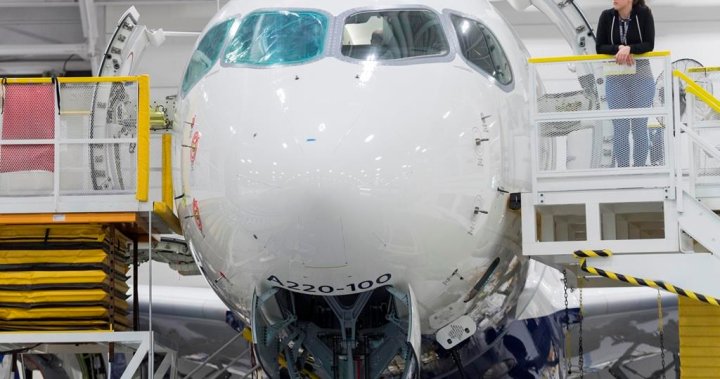Workers at an Airbus assembly plant in Mirabel, Quebec have rejected a contract offer for the third time, with nearly 70 percent of members voting against the agreement in principle. The International Association of Machinists and Aerospace Workers, which represents about 1,300 employees at the facility, has been in negotiations with Airbus regarding a new collective agreement. Despite reaching a deal that negotiators believed would satisfy members, the vote has shown otherwise. Earlier in the month, workers also rejected a second offer from the employer, with the majority voting in favor of strike action.
The proposed contract included a wage increase of eight percent in the first year, followed by annual increases of three or four percent over a five-year period. Airbus has stated that they are committed to reaching a new collective agreement that is fair for both parties and ensures the long-term success of the A220 plane that is assembled at the Mirabel plant. The rejection of the contract offers by the unionized workers may indicate that they are seeking better terms or improvements in certain areas of the agreement that have not been fulfilled.
Union spokesman Éric Rancourt has expressed disappointment over the rejection of the contract offer, despite negotiations that were thought to have resulted in a satisfactory deal for members. The decision to reject the offer and potentially proceed with strike action reflects the dissatisfaction among the workers with the terms of the proposed agreement. It is unclear at this time what specific issues or concerns led to the rejection of the contract offer by the majority of unionized workers at the Airbus assembly plant.
The ongoing negotiations between the International Association of Machinists and Aerospace Workers and Airbus highlight the challenges faced in reaching a new collective agreement that satisfies both parties. While Airbus has expressed their commitment to finding a solution that is fair and sustainable for the long-term success of the A220 plane production, the repeated rejections of contract offers by the unionized workers indicate that there are still unresolved issues that need to be addressed. The potential for strike action adds further tension to the situation and emphasizes the importance of finding a resolution that meets the needs of all parties involved.
The rejection of the contract offer by the unionized workers at the Mirabel assembly plant raises questions about the future of negotiations between the International Association of Machinists and Aerospace Workers and Airbus. The rejection of two consecutive contract offers and the potential for strike action indicate a significant level of dissatisfaction among the workers with the proposed terms of the agreement. It remains to be seen how both parties will proceed in order to reach a new collective agreement that meets the needs and expectations of the workers while supporting the long-term viability of the A220 plane production at the facility.
In conclusion, the repeated rejection of contract offers by unionized workers at the Airbus assembly plant in Mirabel, Quebec highlights the challenges and complexities involved in reaching a new collective agreement. Despite efforts to negotiate terms that are fair and sustainable for both parties, the rejection of the proposed contract offers indicates a level of dissatisfaction and disagreement among the workers. The potential for strike action further emphasizes the urgency of finding a resolution that addresses the concerns and needs of all parties involved in order to ensure the continued success of the A220 plane production at the Mirabel facility.


